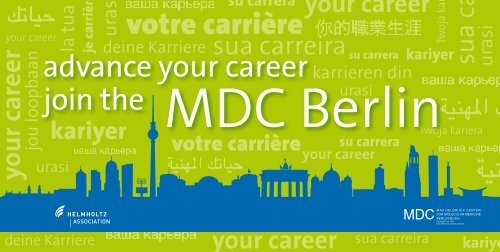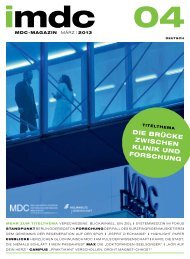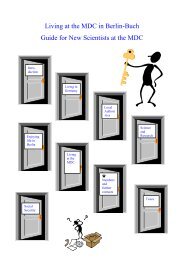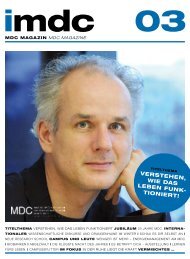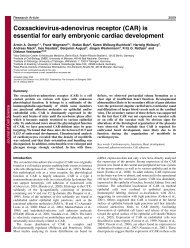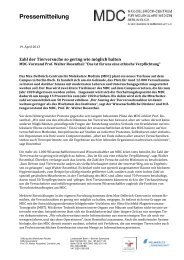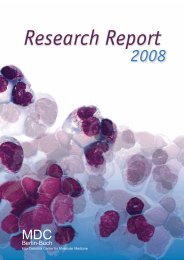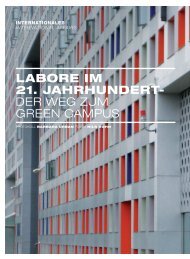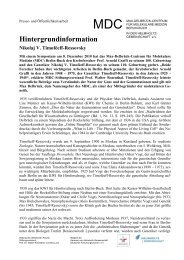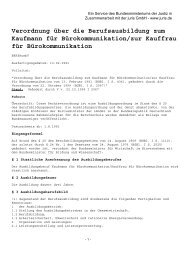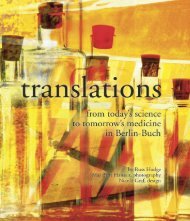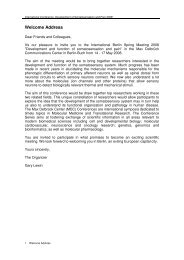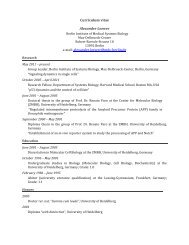your career - MDC
your career - MDC
your career - MDC
You also want an ePaper? Increase the reach of your titles
YUMPU automatically turns print PDFs into web optimized ePapers that Google loves.
<strong>your</strong> <strong>career</strong><br />
<strong>your</strong> <strong>career</strong><br />
jou loopbaan<br />
la tua c<br />
urasi<br />
je carrière<br />
urasi<br />
kariyer<br />
deine Karriere<br />
su carrera <strong>your</strong> <strong>career</strong> ca<br />
sua carreira sua<br />
votre carrière<br />
deine Karriere<br />
advance <strong>your</strong> <strong>career</strong><br />
join the<br />
<strong>MDC</strong> Berlin<br />
urasi<br />
Twoja kariera<br />
votre carrière<br />
<strong>your</strong> <strong>career</strong><br />
su carrera<br />
karrieren din<br />
su carrera<br />
<strong>your</strong> <strong>career</strong><br />
sua carreira<br />
Twoja kar<br />
kariyer<br />
urasi<br />
MAX DELBRÜCK CENTER<br />
FOR MOLECULAR MEDICINE<br />
BERLIN-BUCH<br />
MEMBER OF THE<br />
HELMHOLTZ ASSOCIATION<br />
kariye
Strong together<br />
The Max Delbrück Center for Molecular Medicine (<strong>MDC</strong>) is a member of the Helmholtz Association, Germany’s largest<br />
scientific research organization. The Helmholtz Association is a community of 18 publicly funded research centres,<br />
which are legally independent entities. Together they employ almost 34,000 of staff and have a total annual budget of<br />
approximately €3.4 billion (2012). These centres can be viewed as national labs, which operate and manage unique largescale<br />
facilities and scientific infrastructure, and perform world-class research in strategic programmes in the six scientific<br />
core fields: Energy, Earth and Environment, Health, Key Technologies, Structure of Matter, Aeronautics, Space and Transport.<br />
www.helmholtz.de
Who we are: Key facts and numbers<br />
<strong>MDC</strong> research covers a diverse interdisciplinary spectrum of biomedical sciences, integrating basic and clinical research.<br />
Starting from gene and protein families, our researchers focus on (patho-) physiological processes relevant to most<br />
debilitating illnesses, including cancer, neurodegeneration and cardiovascular & metabolic diseases. The <strong>MDC</strong> is<br />
recognised internationally for its outstanding research, evidenced by its high ranking among the top twenty life science<br />
institutes worldwide in the field of molecular biology/genetics based on citations (Thomson Reuters*)<br />
*http://www.timeshighereducation.co.uk/story.asp?storyCode=410342§ioncode=26<br />
more than 60 basic science and clinical research groups<br />
more than 1,500 staff from more than 55 countries, including<br />
approx. 1,000 scientific staff<br />
approx. €90 million annual budget<br />
shared 2 nd DFG-funding ranking place nationwide (German Research<br />
Foundation Förderatlas 2012)<br />
ERC: 5 starting and 4 advanced grants<br />
EMBO: 7 members, 2 YIP awards<br />
3 Leibniz prize-winners, 5 German Cancer Award laureates
Areas of special emphasis at the <strong>MDC</strong><br />
The Max Delbrück Center for Molecular Medicine carries<br />
out basic biomedical research, with the aim to improve our<br />
understanding of the causes of diseases at the molecular<br />
level, in order to better diagnose, treat and prevent them.<br />
The <strong>MDC</strong> research programme is centred on main<br />
four research areas:<br />
Cardiovascular and Metabolic Diseases<br />
Cancer<br />
Diseases of the Nervous System<br />
Medical Systems Biology<br />
The recently established and rapidly growing Berlin Institute<br />
of Medical Systems Biology (BIMSB) constitutes a major<br />
expansion of the <strong>MDC</strong>’s current scientific programme,<br />
focusing on post-transcriptional regulation of the genome<br />
and its impact on health and disease. It combines highthroughput<br />
technologies, scientific expertise in proteome<br />
and metabolome analysis and bioinformatics in a set-up<br />
that is unique in Germany.<br />
The mission upon which the <strong>MDC</strong> was founded two<br />
decades ago is to translate findings from basic biological<br />
research into the field of medicine, i.e. bringing sciencefrom<br />
bench to bedside. As a joint initiative of the <strong>MDC</strong> and<br />
the Charité Universitätsmedizin, the Experimental and<br />
Clinical Research Center (ECRC) offers a unique framework<br />
for patient-oriented research and clinical studies in a<br />
research-driven environment and excellent <strong>career</strong> development<br />
opportunities in translational medical research.<br />
For more detailed information on the <strong>MDC</strong> research please download our Research Report at: http://mdc-berlin.de/en/ research/research_report/index.html
State of the art technology platforms on campus<br />
The German Chancellor Angela Merkel visits the Berlin<br />
Institute for Medical System Biology at the <strong>MDC</strong><br />
and starts the brand new single-molecule real-time<br />
sequencer (produced by Pacific Biosciences), currently<br />
the most modern technology for genomics analysis.<br />
Next Generation Sequencing<br />
Micro-Arrays<br />
Quantitative Mass Spectrometry<br />
Targeted Proteomics<br />
Integrative Proteomics & Metabolomics<br />
Bioinformatics & Mathematical Modelling<br />
Transgenics<br />
In vivo Mouse Phenotyping<br />
Preparative Flowcytometry<br />
Confocal & Two Photon Microscopy<br />
Electron Microscopy<br />
Ultrahigh Field MR Imaging & Spectroscopy<br />
Protein Sample Production<br />
NMR<br />
Small Molecule Screening Unit<br />
Genome-Wide RNA-Interference
We have a child day-care facility and guest-houses directly on campus.<br />
Furthermore, the <strong>MDC</strong> Welcome Centre assists new-coming scientists with<br />
all formalities (e.g. visas, employment law, health insurance, taxes, etc.).
<strong>MDC</strong> post-docs<br />
There are about 200 post-doctoral researchers (and more than 350 PhD<br />
students) pursuing their research <strong>career</strong> at the <strong>MDC</strong>. About one third come<br />
from abroad, representing a vibrant community of more than 55 nationalities.<br />
There are a number of possibilities of joining the <strong>MDC</strong> as a post-doc, such as<br />
· <strong>MDC</strong> post-doc fellowship programme (1 year)<br />
· The Helmholtz Postdoc Programme (up to 3 years)<br />
www.helmholtz.de/en/working_at_helmholtz/postdoktoranden/helmholtz_<br />
postdoc_programm/<br />
· Humboldt Research Fellowship for Postdoctoral Researchers (up to 2 years)<br />
www.humboldt-foundation.de/web/humboldt-fellowship-postdoc.html<br />
· EMBO short- or long-term fellowships:<br />
www.embo.org/programmes/fellowships.html<br />
· Human Frontier Science Program: www.hfsp.org/funding/postdoctoral-fellowships<br />
For current open positions please visit our web-site:<br />
www.mdc-berlin.de/en/jobs/index.php
Gaining independence<br />
The <strong>MDC</strong> offers special programmes for talented scientists<br />
who would like to gain independence early in their <strong>career</strong>:<br />
The <strong>MDC</strong> Delbrück Fellowships for post-docs (3 + 2 years)<br />
The <strong>MDC</strong> Cécile Vogt Fellowships for female post-docs<br />
(4 + 2 years)<br />
Both programmes provide post-docs with independent<br />
funding to build up their own scientific programme within a<br />
mentoring host group at the <strong>MDC</strong>.<br />
Our scientists are supported with <strong>career</strong> development activities,<br />
including the Career Pathways series of talks and regular<br />
courses on funding, CV writing, etc. In addition, our female<br />
post-docs can participate in the 18-month <strong>MDC</strong> Mentoring<br />
programme or the Helmholtz-wide Mentoring Programme<br />
“Taking the Lead”.
Oktay I. Kaplan<br />
<strong>MDC</strong> Postdoctoral Fellow<br />
since 2012<br />
PhD (2011) from the UCD,<br />
Dublin, Ireland<br />
Kate Poole<br />
<strong>MDC</strong> Cécile Vogt Fellow since 2012<br />
PhD (2002) from the University of Adelaide,<br />
Australia<br />
Jan Bieschke<br />
<strong>MDC</strong> Delbrück Fellow 2006-2011<br />
Since January 2012 Assistant Professor,<br />
Washington University in St. Louis<br />
PhD (2000) from the University of Göttingen, Germany<br />
I’ve joined the group of Baris Tursun at the BIMSB to study the mechanism of direct<br />
in vivo cell type conversion in Caenorhabditis elegans. I enjoy the excellent scientific<br />
infrastructure and social atmosphere at the <strong>MDC</strong>, with a friendly warm and welcoming<br />
environment for international researchers like myself. In addition to strong scientific<br />
reasons, there is a positive practical benefit of coming to Berlin, since living expenses<br />
here are quite modest – it is probably the cheapest European capital city to live in, but<br />
at the same time definitely one of the most exciting ones!<br />
I became a member of Gary Lewin’s group at the <strong>MDC</strong><br />
as a postdoctoral scientist and have benefited from<br />
a number of Career Development initiatives at the<br />
institute, e.g. I was a participant in the <strong>MDC</strong> Mentoring<br />
programme. Now I am starting to establish my research<br />
independence as a Cécile Vogt Fellow.<br />
The <strong>MDC</strong> Delbrück fellowship enabled me to apply for my own<br />
grants while still being a part of the world-class research team,<br />
enjoying an interdisciplinary environment with an excellent<br />
research infrastructure. I have definitely learned a lot about<br />
leading a group and mentoring students, which is giving me a<br />
head start in my independent research <strong>career</strong>.
<strong>MDC</strong> junior research groups<br />
About a third of the <strong>MDC</strong> labs are led by junior group<br />
leaders. If you aspire to start an independent research<br />
group, join the <strong>MDC</strong> by applying to one of the following<br />
programmes:<br />
Helmholtz Young Investigators Groups (5 years)<br />
www.helmholtz.de/en/working_at_helmholtz/<br />
postdoktoranden/helmholtz_young_investigators_groups/<br />
Alexander von Humboldt Foundation Sofja Kovalevskaja<br />
Award (5 years)<br />
www.humboldt-foundation.de/web/<br />
kovalevskaja-award.html<br />
DFG Emmy Noether Programme (5 years)<br />
www.dfg.de/en/research_funding/programmes/individual/<br />
emmy_noether/in_brief/index.html<br />
Frank Rosenbauer<br />
Helmholtz Young Investigator Group at<br />
the <strong>MDC</strong>, 2005 – 2011<br />
Since 2011 – Professor and department director at<br />
the Institute of Molecular Tumor Biology (IMTB),<br />
University of Münster, Germany<br />
In addition to the start-up funding provided by these<br />
schemes, the <strong>MDC</strong> offers follow-up funding for up to 4<br />
years (subject to successful evaluation). Moreover, all <strong>MDC</strong><br />
group leaders have access to <strong>MDC</strong> intramural funding<br />
programmes, such as 3-year fully-funded positions for PhD<br />
students admitted to the International PhD Programme,<br />
1-year postdoctoral fellowships, funding for technology<br />
transfer projects, etc.
Campus Berlin-Buch<br />
The <strong>MDC</strong> is located at the Campus Berlin Buch, in the green<br />
belt of the greater Berlin area. It takes half-an-hour on the<br />
city-train, S-Bahn, to get to Buch from the city centre, and<br />
many <strong>MDC</strong> scientists ride to work by bike.<br />
The Campus Berlin Buch is a modern science, health and<br />
biotechnology park with a clear focus on biomedicine, where<br />
more than 2200 people work. It provides a unique environment<br />
for scientific exchange and research collaboration,<br />
facilitated by the close proximity of two research institutes,<br />
the <strong>MDC</strong> and the FMP (the Leibniz-Institut für Molekulare<br />
Pharmakologie), university clinics and more than 50 biotechnology<br />
companies. The Campus, with its sculpture park,<br />
exhibitions and a small museum, is also a place of artistic<br />
creativity, inspiration and synergy between science and art.<br />
It is easy to make new friends or chill out after a long week<br />
over a beer at the regular Friday after-work “Beer session”.
Living in Berlin<br />
Berlin is a dynamic and vibrant city located in the heart of Europe. As the<br />
capital city of Germany with a population of 3.5 million, including approx.<br />
a 0.5 million foreign nationals, Berlin is Germany’s largest city. Exceedingly<br />
open and tolerant, the tremendous creative spirit drives both culture and<br />
science.<br />
Frequent and radical changes through Berlin’s turbulent and noticeably<br />
present history have transformed the face of the city many times over. But<br />
despite this, the city has succeeded in becoming a thriving metropolis.<br />
Extraordinary wealth of cultural opportunities – art, music, theatre, cinema –<br />
attracts increasing numbers of visitors, making Berlin one of the most popular<br />
destinations in Europe. It boasts a lively scene with lots of pubs, clubs,<br />
restaurants and cafés. Densely urban areas co-exist with large green spaces,<br />
nature reserves, lakes and rivers all within the city boundaries, offering a truly<br />
metropolitan lifestyle in an unusually pleasant and relaxing atmosphere.<br />
www.berlin.de/international/index.en.php<br />
www.berlin-sciences.com/en/berlin-sciences-navigator<br />
4 universities<br />
7 universities of applied sciences<br />
4 art colleges<br />
23 state-recognised private<br />
universities<br />
70 non-university research<br />
institutions<br />
20 research establishments affiliated<br />
with federal and state ministries
Max Delbrück Center for Molecular Medicine (<strong>MDC</strong>)<br />
Robert-Rössle-Str. 10<br />
13092 Berlin<br />
Germany<br />
Photos: Images courtesy of David Ausserhofer, Carola Bernert, Katharina Bohm, Maj-Britt Hansen,<br />
Peter Himsel, Oktay I. Kaplan, Cécile Otten, Oksana Seumenicht, Collage: Chen Chen and Jochen Meier<br />
Layout: Nicola Graf<br />
www.mdc-berlin.de<br />
Contacts:<br />
For general enquiries:<br />
Dr Oksana Seumenicht<br />
<strong>MDC</strong> International Office<br />
oksana.seumenicht@mdc-berlin.de<br />
For inquiries regarding the <strong>MDC</strong> fellowship schemes:<br />
Ms Jennifer Stewart<br />
jennifer.stewart@mdc-berlin.de<br />
For enquiries regarding the Helmholtz Junior Groups:<br />
Dr Gesa Schäfer<br />
gesa.schaefer@mdc-berlin.de


